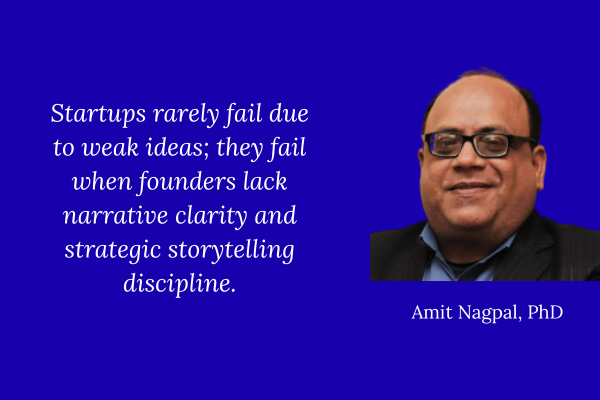Why Governance Matters at the Grassroots
Rupam Tandon discusses why robust corporate governance is becoming a growth imperative for Indian startups and SMEs. From moving beyond founder-led decision-making to building independent boards, embedding ethical leadership, succession planning, and ESG-focused practices, governance is now central to attracting investors, managing risks, and achieving sustainable, scalable growth in India’s dynamic enterprise landscape.
In the fast-paced world of Indian startups and small and medium enterprises (SMEs), innovation and agility are often prioritised. However, robust corporate governance is the foundation that allows these enterprises to scale sustainably, access capital, attract talent, and build public trust. While listed companies in India are subject to regulatory oversight, startups and SMEs—though unlisted—must also recognise that governance is not just a compliance issue but a strategic asset.
With India projected to become the world’s third-largest economy by 2030 and the government’s push for entrepreneurship through initiatives like Startup India, the role of startups and SMEs in shaping India’s economic and social future is critical. Yet, many of these businesses face growing pains when governance structures are either missing, misunderstood, or misaligned with their growth aspirations.
This article explores the imperative for better governance in Indian startups and SMEs, the unique challenges they face, and pragmatic solutions to embed ethical, resilient, and investor-friendly governance practices from the start.
The Governance Gap: Challenges for Startups and SMEs
1. Founder-Centric Cultures
Startups in India are often driven by charismatic founders with a strong vision. While this leadership is vital in the early stages, overdependence on founders can lead to opaque decision-making, conflicts of interest, and resistance to institutionalisation. The lack of checks and balances can stall the transition from a startup to a scalable business.
2. Limited Awareness and Resources
Unlike large corporations, most SMEs lack in-house legal and compliance teams. Governance is viewed as a cost centre, not a value enhancer. The lack of awareness about best practices in governance—be it board independence, internal controls, or stakeholder reporting—leads to short-termism and risk exposure.
3. Investor and Regulatory Pressure
As startups mature and seek external funding—from VCs, private equity, or IPOs—they are expected to demonstrate sound governance practices. However, many founders struggle to meet the expectations of institutional investors, leading to strained relationships or delayed funding.
Additionally, SMEs are increasingly being brought under ESG-related disclosures, especially those part of supply chains for listed companies or multinationals, making governance not just good practice but a business imperative.
4. Informality and Family-Run Structures
A large number of Indian SMEs are family-run businesses where personal and business boundaries are blurred. Informal decision-making, lack of succession planning, and absence of formal governance frameworks often make these entities vulnerable to internal conflicts, mismanagement, or regulatory scrutiny.
Why Governance is a Growth Enabler, Not a Growth Barrier
Contrary to common perception, good governance does not stifle entrepreneurship—it enables it. Here’s how:
- Investor Confidence: Strong governance attracts quality investors and reduces risk premiums.
- Strategic Clarity: Formalising decision rights, role clarity, and reporting structures supports better execution.
- Ethical Safeguards: Prevents fraud, protects IP, and ensures accountability in fast-growth phases.
- Reputation Management: Enhances credibility with customers, regulators, and employees.
- Exit Readiness: Makes the company more attractive for IPOs, acquisitions, or strategic partnerships.
Startups and SMEs that adopt strong governance early on are better positioned to weather downturns, adapt to regulatory change, and create enduring value.
Key Pillars of Governance for Startups and SMEs
1. Board Composition and Advisory Councils
- Start Small, Think Big: Even if regulatory mandates don’t apply, startups can benefit from a well-structured board or advisory council with independent voices.
- Diverse Perspectives: Inclusion of finance, legal, ESG, digital, and industry-specific experts brings balance and maturity to decision-making.
- Governance Cadence: Regular board/advisory meetings, structured minutes, and review of key metrics should become a norm.
2. Transparency and Reporting
- Internal MIS and KPIs: Develop dashboards that track not just financial but also operational and sustainability indicators.
- External Reporting: For funded startups or those in ESG-sensitive sectors, non-financial disclosures and ESG dashboards can offer a competitive edge.
3. Ethical Framework and Risk Culture
- Code of Conduct: Startups and SMEs must articulate and enforce a code of ethics—covering issues like conflict of interest, whistleblower policy, and anti-harassment norms.
- Risk Register: A simple risk register covering financial, operational, reputational, and digital risks can aid in early detection and response.
4. Founder Succession and Delegation
- Letting Go: Founders must recognise when to delegate operational control to professionals and step into strategic roles.
- Succession Plans: Especially relevant for family-run SMEs, planning leadership transitions and training next-gen leaders is vital for continuity.
5. Compliance and Controls
- Regulatory Hygiene: Maintaining statutory compliance with ROC, GST, PF, and labour laws is the baseline. Digitised compliance calendars and tech platforms can help.
- Internal Financial Controls (IFCs): Even basic SOPs around procurement, payroll, and approvals can reduce fraud and improve efficiency.
A Tiered Governance Maturity Model for Startups and SMEs
| Stage | Governance Characteristics | Examples |
| Stage 1: Seed & Early Stage | Informal governance, founder-led decisions, minimal documentation | Solo founder startup, bootstrap mode |
| Stage 2: Growth & VC Funding | Formal board setup, compliance systems, investor reporting begins | Series A-C funded startup |
| Stage 3: Pre-IPO or PE Stage | Board committees, ESG reporting, audits, risk management systems | Late-stage startups, IPO-bound firms |
| Stage 4: Mature SME/IPO | Independent directors, full corporate governance code, stakeholder reporting | Listed SMEs, family businesses professionalised |
The Role of Investors, Incubators, and Ecosystem Enablers
Startups don’t operate in a vacuum. Governance can be nurtured through support from:
Venture Capital and Private Equity Funds
Investors should go beyond financial metrics and encourage startups to adopt board charters, ethics codes, and ESG metrics as part of due diligence and board engagement.
Incubators and Accelerators
These institutions must embed basic governance education as part of their programs—covering board functioning, compliance, and reporting norms.
Government and Industry Bodies
Bodies like MSME Ministry, Startup India, NASSCOM, CII, and TiE can offer toolkits, e-learning, and mentoring on governance best practices tailored for smaller enterprises.
Governance and ESG: A Missed Opportunity?
Many Indian startups and SMEs see ESG (Environmental, Social, and Governance) as a luxury reserved for large corporates. But this view is rapidly becoming outdated. ESG can be a business multiplier—not just a moral obligation.
- Environmental: SMEs in manufacturing, logistics, or agri-tech can track energy use, water consumption, and waste, opening access to green financing.
- Social: Policies on employee welfare, skilling, DEI (Diversity, Equity, and Inclusion), and supply chain ethics matter to global buyers.
- Governance: ESG begins with good governance—integrity in leadership, ethical culture, and responsible oversight.
SMEs and startups that build ESG into their DNA will be better aligned with global standards, improving competitiveness, valuation, and resilience.
Way Forward: A Governance Manifesto for India’s Startup and SME Sector
To truly embed governance as a cultural and operational strength, the following steps are recommended:
For Founders and Promoters:
- Treat governance as strategic, not symbolic.
- Build a high-trust, high-accountability culture from day one.
- Bring in mentors, advisors, and eventually, independent directors who challenge and guide.
For Boards and Advisors:
- Provide oversight, not interference.
- Encourage the adoption of simple but effective controls and dashboards.
- Push for succession, ethics, and long-term planning discussions.
For Policymakers and Regulators:
- Incentivise good governance through tax breaks, ESG-linked loans, or preferential procurement.
- Create a tiered governance code or guidance for unlisted companies, with simplified, scalable templates.
For Academia and Professional Bodies:
- Offer certification programs, micro-courses, and workshops on governance for SME founders, HR leads, and finance heads.
- Promote women and diverse professionals into SME and startup boards.
Conclusion: Governance as a Differentiator
India’s startup and SME sector is vibrant, visionary, and vital to economic growth. But without a governance backbone, even the most promising ventures can falter. Embedding governance early on is not about slowing down growth—it is about sustaining it.
Startups that embrace governance as part of their culture—not just their compliance—will build organisations that endure, inspire, and lead. It’s time for Indian entrepreneurship to be known not only for innovation and scale—but also for stewardship and standards.
Some strong examples of Indian startups and SMEs that exemplify good governance, each illustrating how ethical leadership, structured oversight, and stakeholder responsibility can fuel sustainable growth. These real-world case studies and emerging role models can inspire other founders and boards.
1. Zoho Corp
Bootstrapped Excellence with Governance at its Core
What Makes It a Role Model:
- Despite being privately held and bootstrapped, Zoho has robust internal governance systems.
- Founder Sridhar Vembu emphasizes ethical leadership, employee-centric policies, and long-term thinking over rapid VC-driven scale.
- The company publishes regular insights on its business philosophy and avoids debt-fueled growth, showing strong risk management.
- Emphasizes rural employment, decentralization, and local empowerment—pillars of stakeholder capitalism.
Takeaway for SMEs:
You don’t need external funding to embed governance—clarity of values and responsible leadership are enough to build enduring institutions.
2. Zerodha
Transparent Fintech with a Culture of Self-Regulation
What Makes It a Role Model:
- India’s largest stockbroker, Zerodha, is self-funded, yet voluntarily practices transparent reporting, client-first policies, and lean governance.
- The founders created Rainmatter Foundation to support ESG initiatives—linking business growth to social impact.
- Their openly published revenue reports and social media-based investor communications reflect a culture of openness and accountability.
Takeaway for Startups:
Even high-growth tech firms can set the bar for responsible conduct without external enforcement.
3. Happiest Minds Technologies
Listed SME with ESG Leadership
What Makes It a Role Model:
- A mid-sized IT company that went public with strong ESG credentials, including a Sustainability Report aligned to GRI and UN SDGs.
- Board includes independent directors, women directors, and committee structures, despite its smaller size.
- Focuses on cybersecurity, wellness, and inclusive hiring as part of a stakeholder-oriented culture.
Takeaway for Emerging Companies:
You can be ESG-ready and governance-strong well before an IPO if the right structures and metrics are embedded early.
4. GIVA Jewellery
D2C Startup with Ethical Supply Chain Governance
What Makes It a Role Model:
- GIVA is a growing D2C silver jewelry brand that has invested in ethical sourcing, artisan support, and transparent vendor policies.
- Uses digital tools for customer feedback loops, ensuring accountability and traceability in its ecosystem.
- Although young, it has proactively built governance around sustainability and customer trust.
Takeaway for Consumer Startups:
Product innovation is important—but governance through ethical sourcing, sustainability, and data privacy is what builds a brand legacy.
Emerging Governance Champions to Watch:
| Company | Sector | Governance Practices |
| Furlenco | Subscription-based furniture rental | Formal board with investor oversight, improved reporting post-VC funding |
| LEAD School | EdTech | Clear founder delegation, structured advisory board, and education equity focus |
| FreshToHome | Agri-FoodTech | Traceability, compliance with food safety norms, board governance for quality control |
How These Role Models Inspire Other SMEs
These companies demonstrate that good governance can be:
- Voluntary, not just regulatory
- Embedded from Day 1, not post-facto
- Flexible and contextual, not templated
- A brand and valuation enhancer, not a cost
By prioritising accountability, purpose-driven leadership, and structured oversight, these businesses prove that size is no barrier to responsible governance.
Author Profile

-
Rupam Tandon is a seasoned financial services leader, global strategist, board advisor, and governance evangelist with over three decades of experience spanning investment banking, strategic advisory, board leadership, and startup governance. Her career reflects a blend of domain depth in financial services and an evolving commitment to strengthening corporate and startup governance frameworks.
Rupam’s professional journey began in financial markets and investment banking where she held senior roles with leading global institutions. Over her 30+ year career she has built expertise in banking, compliance, risk management, strategic partnerships, and organizational transformation across diverse regions including India, the United Kingdom, the United Arab Emirates, and North Africa. Her international leadership experience has equipped her with a nuanced perspective on global financial systems, cultural business dynamics, and cross-border governance practices.
In addition to her executive track record, Rupam carries the credential of a Certified Independent Director and is regularly invited to speak at industry forums on governance, risk, and ethics. She is active in advisory circles and contributes to shaping governance discourse for boards and leadership teams, especially in scaling organizations and emerging enterprises.
A thought leader in startup governance, Rupam contributed a specialist chapter on governance in the Enterprising Futures: Global SME Insights 2025 report, where she articulated how pragmatic governance structures act as strategic levers for resilience and investor trust in early-stage ventures. Her insights bridge best practices from established corporates with the agility needs of startups.
Beyond boardrooms, Rupam mentors' women leaders, advises founders on governance readiness, and advocates for ethical leadership as a catalyst for sustainable value creation in enterprises of all sizes.
Latest entries
 FEATURED27 January 2026From Survival to Strategy: How MSMEs Are Redefining Growth in a Fragmented Global Economy
FEATURED27 January 2026From Survival to Strategy: How MSMEs Are Redefining Growth in a Fragmented Global Economy Leadership19 October 2025Family Businesses 2.0: Balancing Tradition with Modern Governance
Leadership19 October 2025Family Businesses 2.0: Balancing Tradition with Modern GovernanceESG11 September 2025The Governance Premium: Why Trust Outperforms Growth
 ESG19 July 2025Enhancing Corporate Governance in Indian Startups and SMEs
ESG19 July 2025Enhancing Corporate Governance in Indian Startups and SMEs








